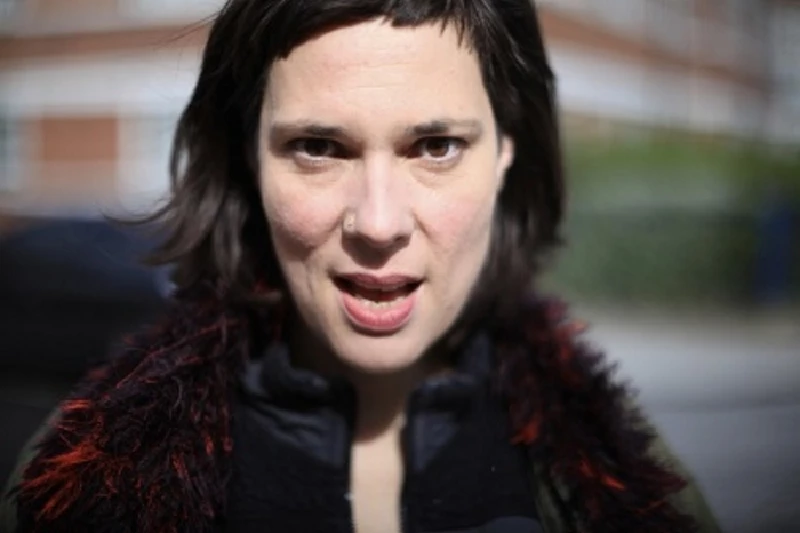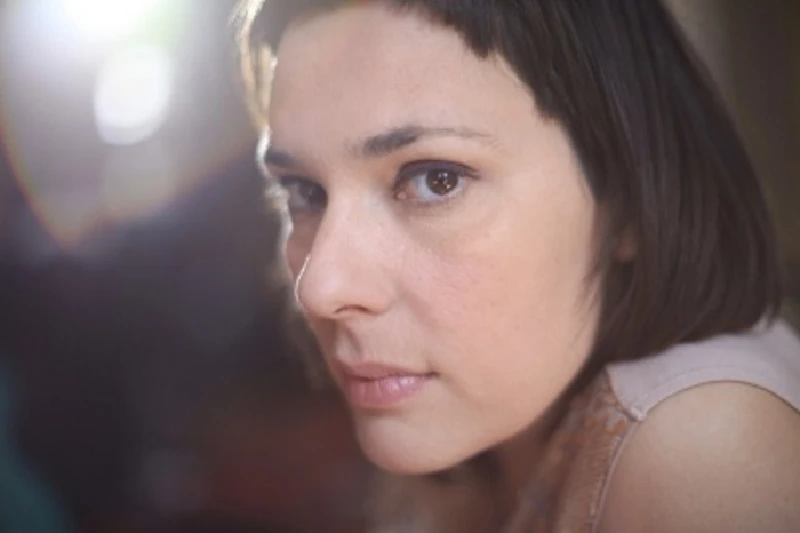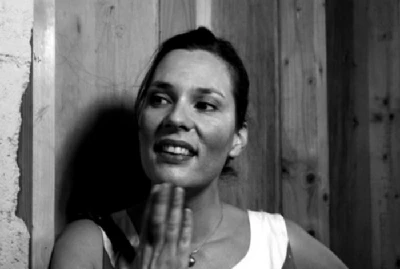Laetitia Sadier - Interview
by Mark Rowland
published: 4 / 7 / 2012

intro
Ex-Stereolab front woman Laetitia Sadier speaks to Mark Rowland about the strong and angry political nature of 'Silencio', her new solo album
Laetitia Sadier is concerned. More than concerned, she is frustrated and angry; angry at the situation that Europe, particularly the UK and France, has found itself in: “I don’t see a very bright future at the moment. In the UK, they are going to cut housing benefit for most people and the message we’re getting is: ‘Go get a job.’ Well, there aren’t any. What are people supposed to do?” Sadier has been keeping a close eye on the economic crisis and the way people and politicians have reacted to it over the course of the recession. As far as she is concerned, we haven’t made any progress at all. “If you look at certain economic expenses in terms of public spending over the past 20 years, it hasn’t increased,” she says. “I’m talking for France, but I’m sure it’s the same for the UK. It has decreased, and at the same time we’re told we’re too greedy, that we cost too much money. In fact, that’s not the reality behind all these things. These are lies…we’re made to pay the bill, for the abuses within this system.” Every move by World leaders throughout the recession has benefitted a relatively small number of people: the rich elite. The rich have had help from government, she says, and large corporations have been let off some rather large tax bills (a prime example being Vodaphone, who got out of paying £6bn in taxes last year). The gap left by this unclaimed tax is then filled with cuts to frontline services, says Sadier, and things cannot improve if that continues. “I feel that there is a big discrepancy between what we’re told on television and the kind of general ideology behind the system, that there is no alternative ideology, that this is how it is and we just have to put up with this shit. It’s crazy that people aren’t told the truth at all and that they tend to believe what their told.” Sadier’s frustration at the current socio-economic state of the world (and Europe in particular) has been channelled into her new solo album, ‘Silencio’, a sharp contrast from her previous record ‘The Trip’, a heartbreaking tribute to her sister Noelle, who committed suicide a short time before the album was recorded. While ‘The Trip’ was incredibly personal, ‘Silencio’ paints a picture with broad brushstrokes. Musically, it’s a more widescreen progression of the sounds explored on ‘The Trip’ – a slightly fuller sound, but still very diverse, mixing tropes of several genres with the same subtlety and panache as Stereolab, as you’d expect from that band’s founding member. Above all, ‘Silencio’ feels like a clear and fairly coherent statement, which Sadier feels was a necessity. “It is quite a contrast from ‘The Trip’,” she says. “It’s not hard to see that sometimes things need to be said. It’s always been my concern. People were saying these things in the 60s. Karl Marx was also alerted by the economic system and its dérive, the fact that it drifts and that it drifts somewhere uncontrolled and quite harmful for most people.” This is not new lyrical territory for Sadier; Stereolab’s lyrics often tackled political issues an ideologies, leading several critics to label the band as Marxists, something that the band’s members (sometimes vehemently) denied. The writings of Marx himself may not factor in her thinking, but Sadier is certainly an advocate of left wing ideals, though perhaps to a more considered degree than mere sloganeering. Certainly, she says, the free market model has tipped itself right off the scales. We need to rebalance the economic system away from the privileged few and back to the wider population. “That doesn’t have to be this radical revolution with defenestration, hanging and guillotining. It can be much more gentle than that. But what I observe, and we saw it in Greece recently, is that people are generally voting for the right wing guy. Greece are at the extreme end of this problem. They voted right wing, like they voted for ‘safety’, which will bring none. So it’s interesting to see how difficult it is for people to change. I think you have to be very, very ready and ripe for change and we’re not there yet. Obviously we’re still not ready, so we need a bit more decrepitude.” Sadier believes that one of the big issues behind people’s somewhat apathetic and accepting attitudes towards the economic situation is that politicians have become much better at using the media to peddle their messages – they are finding their statements being challenged less and less. You have to search deeper and deeper now in order to find the truth behind the soundbite, she says. “When you find that truth, you realise that we are getting the shitty end of the stick, as always, and we’re still not demanding change into the people’s favour, away from the financial system.” Even compared to the semi-politicised outlook of people in the 80s and the generation preceding them, alternative political attitudes among the current generation are slight and incohesive, says Sadier: “It’s kind of a crude generalisation and of course, there are lots of exceptions, but I feel that there is a lack of political awareness and political will to change things.” Alt-rock Ideologies Within the alternative and post rock scenes that Stereolab emerged from, a significant number of musicians and music was driven by progressive ideology. Many loudly advocated a number of causes, particularly socio-political issues such as racism, gender equality and exploitation of workers. With most having built up a following through independent scenes, labels and networks, most also pushed a vaguely entrepreneurial, anti-big corporation message (although many ended up signing with majors). Above all, it was about artistic freedom, and the ability to pursue any ideas that they wanted. “Being independent meant something, doing things and keeping in control of what you do – artistic control was very important for us, and also the financial side of things,” says Sadier. “We did sign to a major record label, but on our own terms, not on their terms at all. It meant something, and making music was about the importance of music and the importance of our art and what we transmitted through our art, rather than just being out there and being commercial and pleasing the media apparatus and making it choose us. It never really did choose us, but a lot of people chose us and found out about us and we managed to have a very lovely career. But the priority certainly was the music and not formatting ourselves to death to please the system.” This attitude often resulted in great music that, as in the case of bands such as Stereolab, often felt like it was keeping things moving and breaking new ground. Bands took risks that sometimes paid off and sometimes failed miserably. Although the 90s also had its fair share of vacuous rubbish, there is a reason why the decade’s more progressive acts are still lauded by music fans and musicians alike. To Sadier, it seems that the mainstream music industry in its current state, aided by the media, has to an extent weeded out the more progressive bands in favour of those with tried and tested sounds. It’s also generally inherent in the attitudes of the young generation. “Brand names make up social tissue. It is a language, a way to communicate, and it has become the way to communicate. I see it a lot in the youth today. They take it quite seriously, to have your Mac and your Nike and blah, blah, blah. Everything gets formatted and categorised, more and more so. There are new words for how to interact between the youth – if you go out with someone and you have kissed them or you haven’t kissed them ¬ ¬– they have different terms for these. There is very little left to mystery; very little left unnamed.” Businesses, in all walks of life, have also become increasingly risk averse, which is not only having an effect on the economy (fewer companies spending on hiring and staff development, for example), but also the art being produced, particularly in popular mediums such as music and film. “The one aspect of Capitalism that was good, that was about entrepreneurs and taking risks, covering new ground, even that’s gone. No one wants to take risks anymore.” But what about the Occupy movement? Wasn’t that a grass roots campaign advocating a system change? Sadier says although it was admirable, it was pretty much doomed to fail: “It was clear that it would lose its strength, because it was vague. It had some nice aspects to it, because it was vague, but when you’re faced with this type of problem, I think you have to be very focused.” Sadier, however, says that she doesn’t see everything as doom and gloom. There is still plenty to enjoy, and even the worst off countries in Europe have it easier than, say, Syria. And besides, the new record is just as personal as it is political; touching on personal growth and change as well as broader social change. The Personal is Political “I’ve realised throughout my life that on a personal level, there are sides of me that are more evolved than other sides, and I know that I can only really change when the most unevolved side of me is ready to.” It’s important to have anything – a record, an event, a piece of art – that gives people a feeling of connection, says Sadier. People are too alienated, she says. “Most of my lyrics have been about this bridge between the ‘I’ and the ‘we’. I make the ‘we’ and the ‘we’ makes me also. It’s a circle; they’re not to be dissociated. And yet they are distinct. It’s kind of paradoxical.” This relationship between the group and the individual is a big theme running through ‘Silencio’. It’s about understanding who you are and how you fit in with wider society – something that Sadier feels she has learned over time. “It’s about learning to know ourselves, first of all. Because when you know yourself, you can trust yourself, and when you trust yourself, you can be responsible for yourself. Then and only then can you project that into the world. So ‘Silencio’ is also a lot about that, this connection between us.” Collaborating Sadier is certainly one to make connections, being one of indie rock’s most prolific collaborators – working with others on her own work as well as guesting on numerous albums. She formed her Stereolab side project, Monade, with Pram’s Rosie Cuckston, and contributed to several High Llamas albums. Other artists she’s worked with include Blur, electronica group Mouse on Mars and the rapper Common. One of her most recent collaborations was with Atlas Sound, a.k.a. Bradford Cox, the lead singer of Deerhunter, on ‘Quick Canal’, which appeared on his ‘Logos’ album. Sadier met Cox on Stereolab’s last American tour – Cox supported the band on half the tour, and travelled with the band in their tour bus. The two of them became friends, and coincidentally share a manager, Martin Pike, who started his career in band management with Stereolab in the early 90s (he used to sell McCarthy T-shirts, the band that Stereolab emerged from). Cox gave Pike a song to pass over to Sadier, asking her to write lyrics and a melody for the track. “I’ve always thought that what he does and what I do are not that far away from each other; kind of musical cousins, or something.” Another recent collaborator is the singer-songwriter Richard Swift, who co-produced ‘The Trip’. Again, Swift sent Sadier a part finished song, which she completed with lyrics and a melody. The track, ‘Resistance Dans L’Ombre’, appeared on the compilation EP ‘La Piscine’, ‘curated’ by Sadier and featuring tracks by Rebecca Gates and Superbravo, as well an additional track by Swift and Sadier respectively. “I really enjoyed working with Richard,” she says. “I didn’t know him previously. It was like the universe had put us together somehow. It worked out so beautifully. I really look forward to working with him again. He’s such a beautiful, creative, musical genius, a shimmering genius. I really enjoyed collaborating with him. I love Mouse on Mars and would like to collaborate more with them because now I’m more secure in what I do, and I wasn’t completely at the time. So I didn’t completely enjoy it, because I didn’t know what I was doing, I didn’t know what I wanted.” Next on the collaboration agenda for Sadier is a song with Giorgio Tuma, an Italian songwriter who cites Stereolab as an influence. Like Stereolab, Tuma makes record collector’s music, consuming a broad spectrum of music before spitting out songs compiled of fragments of the past: “[Tuma] has wrote a fabulous song and makes really beautiful music…I’m working with my friend from Aquaserge in Toulouse, which is always a big pleasure too.” Sadier says that she is open to more collaboration, particularly with new people: “People on Facebook ask me if I will sing on this and that and I started saying yes to everything. But I didn’t have the time for all of it, or the energy! So sometimes I can’t honour everything. I apologise to those that I can’t honour, but I am honoured to be asked.”
Have a Listen:-
Picture Gallery:-



interviews |
|
Interview (2010) |

|
| Stereolab vocalist Laetitia Sadier talks to Tommy Gunnarsson about the inspirations for her debut solo album, 'The Trip' |
reviews |
|
The Trip (2010) |

|
| Excellent pop-oriented debut solo album for Stereolab singer, Laetitia Sadier |
most viewed articles
current edition
Carl Ewens - David Bowie 1964 to 1982 On Track: Every Album, Every SongArmory Show - Interview with Richard Jobson
John McKay - Interview
Colin Blunstone - Thalia Hall, Chicago, 16/7/2025
Bathers - Photoscapes 1
Billie Eilish - O2 Arena, London, 10/7/2025
Loft - Interview
Visor Fest - Valencia, Spain, 26/9/2025...27/9/2025
Sir Tim Rice - Interview
Robert Forster - Interview
previous editions
Manic Street Preachers - (Gig of a Lifetime) Millennium Stadium, Cardiff, December 1999Heavenly - P.U.N.K. Girl EP
Beautiful South - Ten Songs That Made Me Love...
Peter Perrett - In Dreams Begin Responsibilities Interview Part One
Boomtown Rats - Ten Songs That Made Me Love....
Oasis - Oasis, Earl's Court, London, 1995
Coldplay - Wembley Arena. London, 16/8/2022
Prolapse - Interview
Trudie Myerscough-Harris - Interview
Pixies - Ten Songs That Made Me Love...
most viewed reviews
current edition
Davey Woodward - Mumbo in the JumboSick Man of Europe - The Sick Man of Europe
Lucy Spraggan - Other Sides of the Moon
Amy Macdonald - Is This What You've Been Waiting For?
Phew, Erika Kobayashi,, Dieter Moebius - Radium Girls
Suzanne Vega - Flying With Angels
Bush - I Beat Loneliness
Alice Cooper - The Revenge of Alice Cooper
Blueboy - 2
Cynthia Erivo - I Forgive You
Pennyblackmusic Regular Contributors
Adrian Janes
Amanda J. Window
Andrew Twambley
Anthony Dhanendran
Benjamin Howarth
Cila Warncke
Daniel Cressey
Darren Aston
Dastardly
Dave Goodwin
Denzil Watson
Dominic B. Simpson
Eoghan Lyng
Fiona Hutchings
Harry Sherriff
Helen Tipping
Jamie Rowland
John Clarkson
Julie Cruickshank
Kimberly Bright
Lisa Torem
Maarten Schiethart